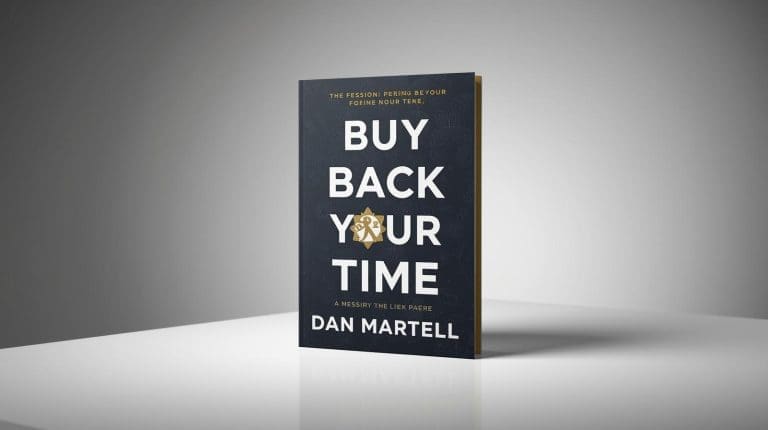
Book Review: Buy Back Your Time by Dan Martell
Lessons for Professional Sport Coaches
As a sports psychologist, I work with professional sport coaches who are constantly juggling competing demands: managing athletes, liaising with support staff, engaging with media, dealing with administration, and still trying to create the best possible training and performance environments. Many coaches I meet are overwhelmed, stretched thin, and struggling to find balance between professional demands and personal wellbeing.
Dan Martell’s book Buy Back Your Time is written for entrepreneurs, but its principles translate directly into the world of high-performance sport. At its heart, the book is about freeing yourself from the trap of overwork by learning how to systemise, delegate, and focus on what truly matters. The aim is not simply to work less, but to reclaim time and energy so you can operate at your highest level — as a leader, a strategist, and a human being.
In this review, I’ll summarise the book’s key insights and show how professional sport coaches can apply them. By viewing coaching through an entrepreneurial lens, sport coaches can adopt tools to reduce burnout, enhance decision-making, and ultimately improve athlete and team performance.
Why This Book Matters for Coaches
Professional sport has never been more complex. Coaches are expected to be tacticians, motivators, psychologists, administrators, talent developers, and media managers. It’s easy to fall into the trap of doing everything yourself. He calls this the “pain line of entrepreneurship” — the point where the demands of the business outgrow what one person can handle. Sport coaches face a similar pain line: once responsibilities exceed capacity, either performance suffers or wellbeing collapses.
The solution is not working harder, but working smarter. This is where Dan’s playbook of “buying back your time” becomes invaluable.
Key Themes from the Book Applied to Coaching
- The Buyback Principle – Don’t do more; instead, buy back your time by offloading tasks that drain energy or distract from high-value leadership.
- For coaches: Stop trying to handle logistics, paperwork, or even certain elements of video analysis personally. Create systems or delegate to staff.
- Buyback Rate (BBR) – He suggests calculating the value of your time, then outsourcing any task that can be done for less.
- For coaches: Ask, “Is this the best use of my expertise?” If a task could be done by an analyst, administrator, or assistant coach, it probably should be.
- Replacement Ladder – A staged approach to delegation: first offload personal admin, then business admin, then delivery tasks, and finally creative/strategic areas.
- For coaches: Begin by freeing yourself from travel booking, scheduling, or logistics before moving on to assistant coaches handling warm-ups or session design.
- Playbooks – SOPs, Systems and documented processes allow others to do tasks reliably.
- For coaches: Standardise warm-ups, recovery protocols, communication templates, and scouting reports so staff can run them consistently.
- The Feedback Loop – Delegation doesn’t mean disappearing. Create loops of feedback so tasks are refined and staff grow in competence.
- For coaches: Regularly review training sessions or scouting work done by staff, provide feedback, and adjust. This develops trust while maintaining quality.
- The Perfect Week / Preloaded Year – Dan advocates designing your ideal calendar in advance, blocking in priorities before they get crowded out.
- For coaches: Proactively schedule recovery days, family time, reflection periods, and key planning windows before the season fills up.
- Dreaming Bigger – He warns against limiting yourself to survival thinking; you must create a compelling vision that guides decisions.
- For coaches: What’s your long-term coaching philosophy and legacy? Let this guide daily choices and where you focus your limited time.
- Energy Management – Focus on tasks that energise rather than drain you. Offload energy-draining work.
- For coaches: If logistics drain you but tactical meetings inspire you, delegate logistics and double down on tactical leadership.
- Letting Go of Control – Many leaders resist delegation because they want perfection. Dan argues for trusting others and allowing for “good enough.”
- For coaches: Allow assistant coaches to lead sessions, even if not perfect. Athletes benefit from variety, and you gain capacity. Why not even include your athletes in the process to develop their leadership skills?
- The Buyback Life – The ultimate goal is to build a life (and career) you don’t need a vacation from.
- For coaches: Sustainable careers require balance. Use these tools to reclaim joy, presence, and longevity in coaching.
Final Reflections
Dan Martell’s Buy Back Your Time is more than a business manual; it is a philosophy of sustainable high performance. For professional sport coaches, the lessons are clear: you cannot do everything yourself, and you should not try. The true role of the coach is to provide vision, clarity, and leadership — not to drown in the weeds of admin or micromanagement.
By embracing delegation, systemisation, and proactive planning, coaches can reduce burnout, maximise their impact, and model balance for athletes. Just as entrepreneurs must learn to buy back time to grow their businesses, coaches must learn to buy back time to grow their teams and sustain their own careers.
If you are a coach who feels perpetually exhausted, who struggles to switch off, or who senses your best work is being diluted by endless small tasks, this book offers a blueprint for change. Apply its principles and you may find not only greater success on the field, but also a richer, more fulfilling life off it.
Why not join our online community – THE SPORTS PSYCHOLOGY HUB – for regular Sports Psychology tips, podcasts, motivation and support.

Best Wishes
David Charlton
Global Sports Psychologist who is located near Newcastle Upon Tyne, UK and willing to travel Internationally. David also uses online video conferencing software (Zoom, Facetime, WhatsApp) on a regular basis and has clients who he has supported in the UK, UAE, Saudi Arabia, Australia and New Zealand.
Managing Director – Inspiring Sporting Excellence and Founder of The Sports Psychology Hub. With over 15 years experience supporting athletes, coaches, parents and teams to achieve their goals, quickly.






